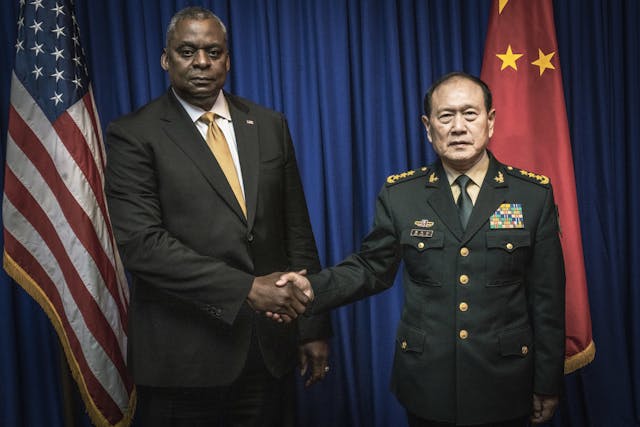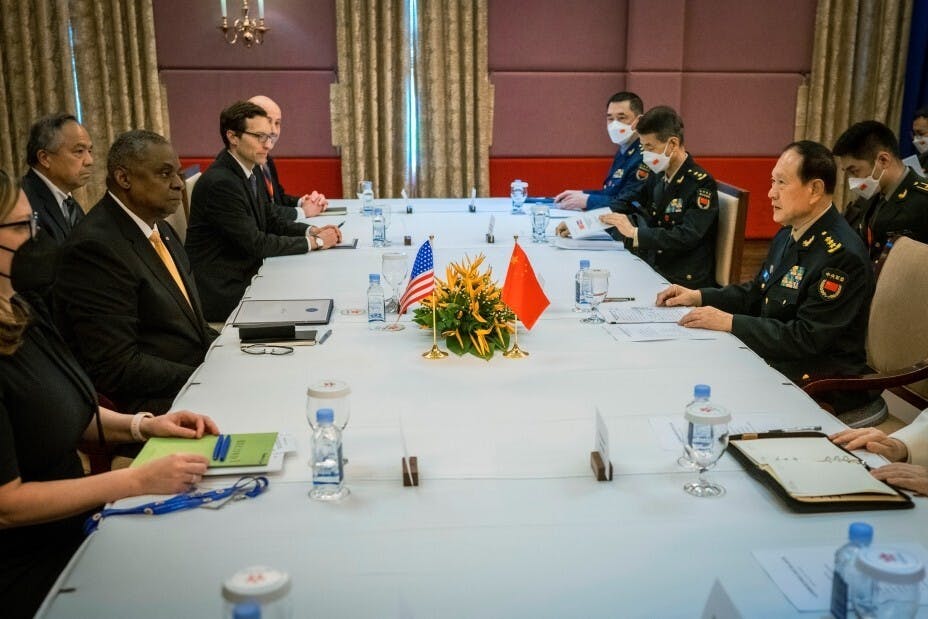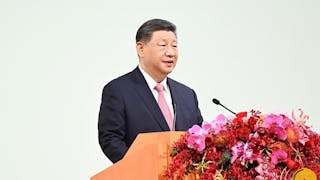11月22日,中國國防部長魏鳳和與美國國防部長奧斯汀在柬埔寨舉行的東盟會議上的會晤表明,中國軍方領導人一直通過其自信的軍事外交與外國防長進行接觸。
雙方同意保持溝通 加強危機管控
新華社對會議進行了簡要報道,稱魏鳳和提到了習近平主席與美國總統拜登在第17次20國集團領導人峰會會談中達成的重要共識。魏鳳和說,「當前中美關係面臨的局面責任不在中方」。他說,中方重視發展兩國兩軍關係,但前提是美方「必須尊重中方的核心利益」,希望美方「信守承諾,把兩國元首共識真正落到實處,採取理智務實對華政策」。最重要的是,魏強調「台灣問題是中國核心利益中的核心,是中美關係第一條不可逾越的紅線」,這與習近平在與拜登會晤時所說的話相呼應。魏鳯和最後強調,「台灣是中國的台灣,解決台灣問題是中國人自己的事,任何外部勢力都無權插手干涉」,這也是強烈呼應習近平對拜登所說的話。據新華社報道,雙方同意保持溝通,加強危機管控,維護地區安全。
美國國防部的解讀更為詳細,強調雙方都需要「負責任地管理競爭並保持開放的溝通渠道」。此外,奧斯汀還討論了降低風險、改善危機溝通、提升操作安全的實質性對話,並對「解放軍軍機在印太地區展現的增加意外事故風險的愈來愈危險的行為」提出了關切。奧斯汀重申,美國將「持續在國際法允許的地方飛行、航行和操作」。有趣的是,報道提到雙方在俄烏衝突中「反對使用核武器」、美方對北韓使用武器計劃表示擔憂。最後,奧斯汀重申美國承諾採取「長期的一個中國政策,該政策以《台灣關係法》、中美三個聯合公報和『六項保證』為指導」。他肯定了維護兩岸和平穩定的重要意義,反對任何改變現狀的舉動。
自2022年4月以來,魏鳯和的軍事外交或許比以往更加自信,4月20日,他還與奧斯汀通電話,雙方強調要落實總統共識,即相互尊重、和平共處、避免衝突,以及美國堅持「一個中國」政策的必要性。11月的面對面會談可以看作是雙方4月通話的延伸。

中方多次重申反單邊、反霸權主義
4月份,魏鳯和以國務委員兼國防部長雙重身份會見伊朗總統萊希。據《環球時報》4月28日報道,雙方同意在「美國日益不友善和動盪的全球局勢」的背景下深化軍事合作。魏鳯和的訪問被描述為在雙方達成為期25年的全面合作協議後,中國對伊朗的最高級別正式訪問。值得注意的是,中伊都反對單邊主義、霸權主義和外部干涉,伊朗支持中方維護自身核心利益。反霸權主義是中伊兩國官方交往中的共同語言。其他合作領域包括反恐、抗擊新冠病毒措施。魏在早些時候訪問哈薩克和土庫曼時重申了反恐主題,這兩個國家都是上海合作組織的成員國。
4月25日,魏鳳和在努爾蘇丹會見哈薩克總統托卡耶夫,強調雙方將於2022年慶祝建交30周年。雙方強調要成為永久全面戰略夥伴,保持國際政治高層合作。雙方承諾在維和行動、聯合演習、人員培訓等方面加強軍事合作。中國國防部的一篇新聞報道補充說,中國反對外部勢力在哈薩克策動任何「顏色革命」,支持哈方採取有力舉措維護國家安全和社會穩定,再次顯示出反霸權的立場。魏鳳和還與哈薩克國防部長扎克瑟雷科夫就國際和地區安全問題進行了討論,包括俄烏衝突和阿富汗問題。
4月27日,魏鳯和會見土庫曼總統別爾德穆哈梅多夫,加強雙邊合作。別爾德穆哈梅多夫對兩國在政治、貿易、外交、文化、人道主義援助和人員往來等方面的重要關係表示讚賞。中國是土庫曼最大的貿易夥伴之一,目前有1400多名土庫曼學生在華學習。總統表示,希望兩軍加強裝備技術和人員培訓方面的合作。根據中國環球電視網(CGTN)的報告,中國支持土庫曼的中立立場,支持自己的發展道路,同時反對外部干涉其內政。魏鳯和還會見了土庫曼國防部長貢多格德耶夫,雙方一致認為有必要加強軍事交流、人員培訓和反恐合作。
疫情期間以視訊交流
魏鳳和自信的軍事外交可以追溯到2021年12月,當時他利用視像會議與各國防長進行交流。 2021年12月7日,他在2021年首爾聯合國維和問題部長級會議上發表講話,表示中國始終維護聯合國權威和地位,踐行多邊主義,同聯合國合作日益深化。他強調,中國已派出5萬多人次參加聯合國維和行動,已經成為第二大聯合國會費國、第二大維和攤款國。
2021年12月27日,魏鳯和與時任日本防衛大臣岸信夫進行了兩個小時的視頻電話會議。據日本防衛省消息,兩國外長就東海、「尖閣諸島」(釣魚島)、台灣問題、南海緊張局勢。雙方同意在2022年底前設置海空聯絡機制熱線,管控風險的重要性。日本防衛省則表示,反對任何改變現狀的舉動。
針對日方關切,根據中國國防部的微信公眾號,魏鳯和強調,中國將堅定維護領土主權和海洋權益,雙方應努力維護東海局勢穩定。魏鳯和呼籲日方正視歷史,以史為鑑,同時肯定雙方應加強高層交往和務實合作,包括拓展海空聯絡機制內容,共同管控風險,防止矛盾升級。魏鳯和又重申了中方在台灣問題和南海問題上的立場。
中日防長視像會議最重要的成果是雙方同意在2022年底前設置海空聯絡機制熱線──這是雙方在最大程度地降低突發及意外軍事衝突風險方面取得的突破。
2021年11月,魏鳯和還與印尼國防部長蘇比安托進行了視像會談。雙方均表示反對霸權主義和冷戰思維,就維護亞太地區和平與穩定達成共識。雙方還共同努力抗擊新冠病毒,並通過聯合軍事演習和人員培訓加強軍事合作。
中國加強與各國防長溝通
總的來說,魏鳯和的軍事外交出現了一些突出特點。在去年底新冠病毒肆虐期間,他利用視像會議加強了與包括日本在內的各國防長的對話和溝通,中日在設置海空聯絡機制熱線方面取得了突破。2022年4月至2022年11月,魏鳳和以國務委員和國防部長雙重身份,親自出訪各國,與各國總統進行了面對面接觸。4月份他對土庫曼和哈薩克的訪問意義重大。反霸權主義、主張多邊主義和反對外部干涉的主題是中國自信的軍事外交特點。中國國防部長也在他所訪問的國家試圖增進相互了解,鞏固反霸權紐帶,從某種意義上說,開展了統一戰線工作。近日,魏鳯和與奧斯汀的會晤意義重大,為落實習近平和拜登達成的共識,迅即進行了後續會晤。儘管雙方在會晤中正式重申各自的立場,但雙方決心建立信任、加強溝通、採取求同存異的原則,無疑是中美兩軍關係發展的積極舉措。
China’s Assertive Military Diplomacy
The meeting between the Chinese Defence Minister Wei Fenghe and the US Secretary of Defence Lloyd Austin during the ASEAN meeting in Cambodia on November 22 indicated that the Chinese military leader has been engaging with foreign counterparts through its assertive military diplomacy.
The Xinhua news agency carried a brief report of the meeting, saying that Wei Fenghe pointed to the important consensus reached by President Xi Jinping and US counterpart Joe Biden during the talks at the 17th Group of 20 Summit. Wei added that the US is “responsible for the current situation in the China-US relations.” According to Wei, China attached importance to the development of relations between the two countries and two militaries, but the precondition is that the US side “must respect China’s core interests.” Wei hoped that the US “could keep its words and promises, truly implement the consensuses reached by the two heads of state and adopt rational and pragmatic policies towards China.” Most importantly, Wei stressed that “the Taiwan question is the core of China’s core interests and the first insurmountable red line in China-US relations” – a remark that echoed what President Xi said in the presidential meeting with Biden. Wei finally emphasized that the “Taiwan is China’s Taiwan, and the settlement of the Taiwan question is the Chinese people’s own affairs and brooks no foreign interference” – another comment that strongly echoed what Xi told Biden. The two sides, according to the Xinhua report, agreed to maintain communications, consolidate crisis management, and retain regional security.
The readout from the US defence Department was a bit more detailed, emphasizing the need for both sides to “responsibly manage competition and maintain open lines of communication.” Moreover, Austin discussed substantive dialogue to reduce risks, improve crisis communications, enhance operational safety, and raised concerns about “the increasingly dangerous behaviour demonstrated by the People’s Liberation Army aircraft in the Indo-Pacific region that increases the risk of an accident.” Austin added that the US will “continue to fly, sail, and operate wherever international law allows.” Interestingly, the readout mentioned that both sides “oppose the use of nuclear weapons” in the Russo-Ukrainian conflicts. The US side added its concern about the use of weapons programs by North Korea. Finally, Austin repeated the US commitment to adopting the “longstanding one China policy, which is guided by the Taiwan Relations Act, the Three US-China Joint Communiques, and the Six Assurances.” He affirmed the significance of maintaining peace and stability across the strait and opposed any move to change the status quo.
Wei’s military diplomacy has perhaps become a more assertive phenomenon than before since April 2022, when he also had a phone conversation with Austin on April 20 during which both sides emphasized the need to implement their presidential consensuses, namely mutual respect, peaceful coexistence, the avoidance of conflicts, and the need for the US to stick to the one-China policy. The November face-to-face meeting could be seen as an extension of the phone call between the two sides in April.
In April, Wei visited the Iran President Ebrahim Raisi in the dual capacities as a Chinese State Councillor and Defence Minister. Both sides agreed to deepen military cooperation amid the context of, according to Global Times on April 28, “an increasingly hostile US and tumultuous global situation.” Wei’s visit was described as the highest-ranking Chinese official visit to Iran after both sides had reached a 25-year Comprehensive Cooperation Agreement. It is noteworthy that both China and Iran oppose unilateralism, hegemonism and external interference, and that Iran supports China’s protection of its core interests. Anti-hegemonism was a common language used by both China and Iran in their official interactions. Other areas of cooperation included anti-terrorism, anti-Covid-19 measures. The anti-terrorism theme was repeated by Wei during his earlier visits to Kazakhstan and Turkmenistan, both are the members of the Shanghai Cooperation Organization.
On April 25, Wei Fenghe met Kazakh President Kassym-Jomart Tokayev met in Nur-Sultan, emphasizing that both sides would celebrate the 30th anniversary of the establishment of diplomatic relations in 2022. Both sides stressed the need to become permanent comprehensive strategic partners and maintain high-level cooperation in international politics. They vowed to strengthen military cooperation in terms of conducting peace-keeping operations, joint exercises, and personnel training. A news report from the Chinese Defence Ministry added that China opposed any foreign country to plan for any “colour revolution” in Kazakhstan and that it supported the latter to protect national security and social stability – again showing the element of anti-hegemonism. Wei also discussed with the Kazakh Defence Minister Ruslan Zhaksylykov on the international and regional security issues, including the Russo-Ukrainian conflicts and the Afghan issue.
On April 27, Wei visited the Turkmenistan President Serdar Berdimuhamedov to strengthen bilateral cooperation. Berdimuhamedov expressed his appreciation of the important relations between the two countries in the dimensions of politics, trade, diplomacy, culture, humanitarian aid and human exchanges. China is one of Turkmenistan’s largest trading partners with more than 1,400 Turkmen students currently studying in China. The President expressed his hope that the two militaries would strengthen cooperation in equipment technology and personnel training. China, according to a CTGN report, supports Turkmenistan’s neutrality and supports its own developmental path while opposing external interference in its domestic affairs. Wei also met Defence Minister Begench Gundogdyev, and both agreed on the need to strengthen military communication, training, and anti-terrorist cooperation.
Wei Fenghe’s assertive military diplomacy could be traced back to December 2021 when he relied on video meetings to interact with his counterparts in various countries. On December 7, 2021, he delivered a speech at the 2021 Seoul United Nations Peacekeeping Ministerial Meeting, saying that China upheld the UN authority and sanctity, supported multilateralism, and deepened cooperation with the UN steadily. He stressed that China has sent over 50,000 peacekeepers to UN peacekeeping operations and that it became the second largest financial contributor to the UN and UN peacekeeping work.
On December 27, 2021, Wei has a video teleconference with his Japanese counterpart Nobuo Kishi for two hours. According to the Japanese Defence Ministry information, both ministers exchanged views on a range of issues, including the East China Sea, the Senkaku (Diaoyu in Chinese) Islands, the Taiwan issue, the tension over South China Sea, and the importance of beginning a hotline aerial and maritime communication between the two sides by the end of 2022. The Japanese Defence Ministry said that it opposed any move to change the status quo.
In response to the Japanese concerns, General Wei stressed that, according to the Chinese side’s report, China would firmly safeguard its territorial sovereignty and maritime rights and interests. Wei called on both sides to maintain stability in the East China Sea and he appealed to the Japanese side to learn from history, while affirming the need to consolidate high-level exchanges and cooperation on both sides, including the need to expand the content of maritime and air liaison mechanism to jointly control risks and prevent conflicts escalation. Wei reiterated the Chinese stance on the Taiwan question and the South China Sea issue.
The most important outcome of the video conference meeting was the recognition by both sides to set up the hotline to deal with maritime and aerial communications by the end of 2022 – a breakthrough in both sides to minimize the risks of sudden and accidental military conflicts.
In November 2021, Wei also held a video discussion with his Indonesian counterpart Prabowo Subianto. Both sides vowed to oppose hegemonism and the Cold War mentality and reached consensus on the need to safeguard peace and stability in the Asia-Pacific region. Both sides also worked together to combat Covid-19 and enhance military cooperation through joint military drills and personnel training.
In conclusion, some prominent features came up in Wei’s assertive military diplomacy. During the continuation of Covid-19 by the end of last year, he relied on video conferencing to enhance dialogue and communications with his counterparts in various countries, including Japan where a breakthrough in setting up a hotline to manage aerial and maritime issues could be seen. From April to November 2022, Wei made personal and visits to different countries, having face-to-face contacts with the presidents of different countries in the dual capacities of being a State Councillor and Defence Minister. His April visits to Turkmenistan and Kazakhstan were important and the themes of anti-hegemonism, multilateralism and opposition to external interference marked the feature of China’s assertive military diplomacy. In a sense, the Chinese Defence Minister also conducted united front work on the countries he visited, trying to enhance mutual understanding and consolidate the bond against hegemonism. The recent meeting between Wei and Austin was significant, marking an immediate follow-up meeting to pursue the consensuses reached by President Xi and President Biden. Although both sides reiterated their positions formally in meetings, their determination of building up trust, enhancing communications, and adopting the principle of agreeing to disagree are undoubtedly positive moves forward in the development of Sino-US military relations.




































